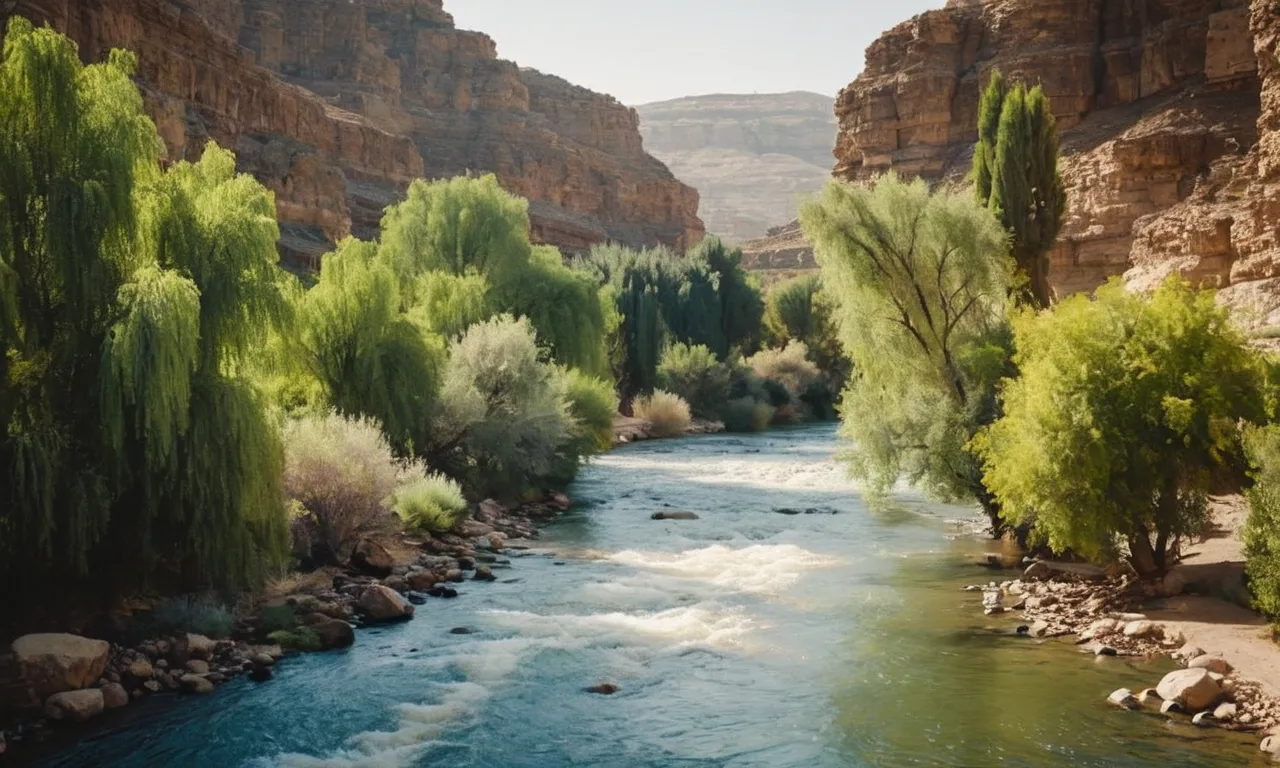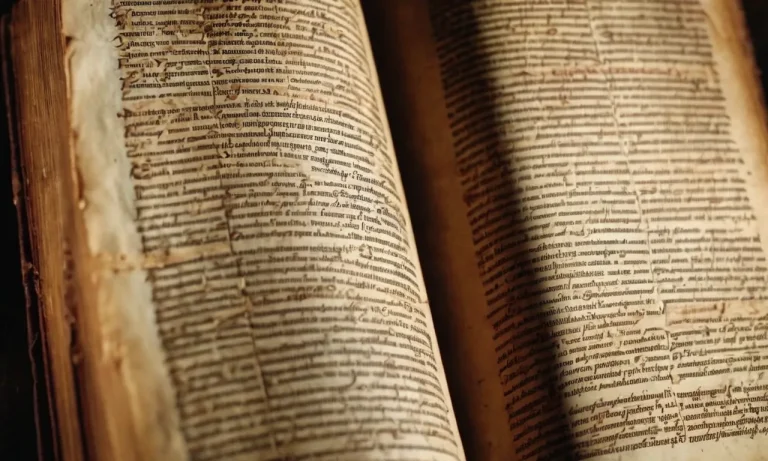How Many Times Was The Jordan River Parted In The Bible?
The parting of the Jordan River is one of the most iconic miracles in the Bible. As the Israelites stood before the swollen river, needing to cross to enter the Promised Land, God miraculously parted the waters to allow them safe passage.
People often wonder – how many times did God perform this awe-inspiring feat? In this comprehensive article, we will analyze the biblical accounts to uncover the answer.
If you’re short on time, here’s the quick answer: The Jordan River was parted miraculously two times in the Bible.
The First Parting of the Jordan River
Israelites Camp at the Jordan River
After 40 years of wandering in the wilderness, the Israelites finally arrived at the banks of the Jordan River, ready to enter the Promised Land. As described in the Book of Joshua, the Israelites set up camp along the eastern bank of the Jordan, directly across from the fortified city of Jericho.
This momentous event likely took place around 1400 BC.
The Israelite camp at the Jordan River marked the end of their long journey from Egypt and the beginning of a new chapter in their history. Under the leadership of Joshua, who had succeeded Moses, the people prepared themselves spiritually and logistically for the conquest of Canaan.
They had come through many trials and tribulations together as a nation, and now stood united and ready to claim the land God had promised them.
God Parts the Jordan for the Israelites to Cross
One major obstacle stood between the Israelites and the Promised Land – the flooded Jordan River. At flood stage, the river would have been impossible to cross by conventional means. But God miraculously intervened on Israel’s behalf once again by parting the waters of the Jordan.
This allowed the entire nation to cross over on dry ground into Canaan.
The parting of the Jordan for Israel to cross over mirrored their earlier Red Sea crossing after the Exodus from Egypt. In both cases, God supernaturally split the waters so His people could walk through safely.
As Joshua 3 recounts, as soon as the feet of the priests carrying the Ark of the Covenant touched the water, the Jordan divided and stood up in a heap as the people hurried across.
This awe-inspiring public miracle was designed to bolster the Israelites’ faith as they followed God’s lead into the unknown perils of Canaan. It also struck fear into the hearts of the pagan Canaanites living on the west side of the Jordan as news of this miracle spread.
The Jordan Stops Flowing and Stands Still
The most stunning aspect of the Jordan River parting miracle was that the massive flow of water completely halted. Rather than just splitting to each side, the Bible says the waters actually stood still in a heap, allowing the river bed to become dry enough for the millions of Israelites to walk across.
According to Joshua 3:16, the moment the priests’ feet touched the water’s edge, “the waters which came down from upstream stood still, and rose in a heap very far away at Adam, the city that is beside Zaretan.
So the waters that went down into the Sea of the Arabah, the Salt Sea, failed, and were cut off; and the people crossed over opposite Jericho.”
For this to occur, God supernaturally intervened to stop the flow from upstream. At the same time, the waters below in the Dead Sea and Arabah basin also stopped flowing. For hours, the Jordan River ceased moving while Israel passed over the dry riverbed.
Only after the entire nation completed their crossing did God allow the waters to resume their normal course, as described in Joshua 4.
The Second Parting of the Jordan River
Elijah and Elisha Travel to the Jordan
After Elijah had defeated the prophets of Baal in a dramatic showdown on Mount Carmel, he fled from the wrath of Queen Jezebel to the wilderness. God met Elijah and told him to anoint Elisha as a prophet to succeed him.
After Elijah found Elisha plowing a field and put his cloak on him, Elisha left his oxen and went with Elijah to become his attendant (1 Kings 19:19-21).
Years later, as Elijah was nearing the end of his earthly ministry, God told him to travel to the Jordan River. Elijah and Elisha set out on the journey together. Along the way, Elijah told Elisha to stay behind because God had told Elijah to go to the Jordan alone.
But Elisha insisted on coming, saying “As surely as the LORD lives and as you live, I will not leave you.” So they continued on together (2 Kings 2:1-6).
Elijah Parts the Waters with His Cloak
When Elijah and Elisha reached the Jordan River, Elijah took his cloak, rolled it up and struck the water with it. Instantly, the waters parted and left dry ground for them to walk across. This miraculous parting echoed the Lord’s parting of the Red Sea for Moses and the Israelites centuries earlier (see Exodus 14).
As Elijah and Elisha crossed over on dry land, a group of prophets from Jericho who were watching said, “The spirit of Elijah is resting on Elisha” (2 Kings 2:7-15).
The Jordan River marked the border of the Promised Land. By parting its waters, Elijah was symbolically allowing Elisha to cross into his prophetic ministry in Israel. Earlier, when putting his cloak on Elisha, Elijah was indicating God’s anointing and authority passing to Elisha.
Now, the parting of the Jordan demonstrated that Elisha had indeed inherited Elijah’s spiritual power.
Elijah is Taken to Heaven, Elisha Crosses Back Over
After Elijah and Elisha crossed the Jordan, Elijah said to Elisha, “Tell me, what can I do for you before I am taken from you?” Elisha asked for a double portion of Elijah’s spirit. Elijah said that would only happen if Elisha saw him being taken away.
As they were walking and talking, suddenly a chariot of fire pulled by horses of fire came between them, and Elijah was carried up to heaven in a whirlwind. Elisha cried out and tore his clothes in grief (2 Kings 2:9-12).
Elisha did see Elijah taken, so he picked up Elijah’s cloak and went back to the Jordan. He struck the waters and cried, “Where now is the LORD, the God of Elijah?” Immediately the waters parted again, and Elisha crossed back over, being acknowledged by the prophets as having received a double portion of Elijah’s spirit and now holding his authority.
The Jordan remained parted for Elisha, confirming that he was indeed Elijah’s prophetic successor (2 Kings 2:13-15).
Significance of the Jordan River Partings
Display of God’s Power and Protection
The parting of the Jordan River was a remarkable demonstration of God’s power and protection over His people. As the Israelites approached the swollen river, God miraculously stopped the flow of water, allowing the entire nation to cross over on dry ground (Joshua 3:14-17).
This incredible event parallels the parting of the Red Sea during the Exodus. On both occasions, God intervened supernaturally to deliver His people from harm and lead them into the Promised Land.
The Jordan parting served as a testament that the Lord’s presence remained with Israel after 40 years in the wilderness. As Joshua 3:7 states, it was intended to strengthen the Israelites’ faith in God.
The miraculous crossing built their confidence that He would continue to fight for them and fulfill His promises. It was also a statement to surrounding nations about Israel’s omnipotent Protector.
Moreover, the precision timing of the event conveyed God’s sovereignty over nature and history to achieve His purposes. As Joshua 4:23 declares, the drying up of the Jordan demonstrated God’s might “so that all the peoples of the earth may know that the hand of the Lord is mighty.” The parting was not a random occurrence but an intentional act of divine intervention on Israel’s behalf.
Confirmation of Leadership Transitions
The Jordan River miracles coincided with two major leadership changes for the Israelites. The first parting ratified Joshua’s succession of Moses as the new leader. As Joshua 3:7 states, God used the event so “that you may know that as I was with Moses, so I will be with you.” By mirroring Moses’ parting of the Red Sea, God confirmed Joshua’s authority to bring the people into Canaan.
The second parting involved the priests carrying the Ark of the Covenant into the river ahead of the nation (Joshua 3:14-16). This symbolized God’s presence guiding His people into their inheritance. It was a commissioning of sorts for the priests’ expanded role of leading worship in the Promised Land.
In both cases, the miraculous crossings authenticated and smoothed leadership changes during a major transition period for Israel. God demonstrated that His divine help would continue, despite the passing of the torch to a new generation.
Conclusion
In summary, Scripture documents two miraculous partings of the Jordan River. The first allowed the Israelites to enter Canaan after 40 years of wilderness wanderings. The second confirmed Elisha’s succession of Elijah as a prophet by letting him cross back over the river alone.
These awe-inspiring miracles instilled faith and revealed that God was fighting for His people.








